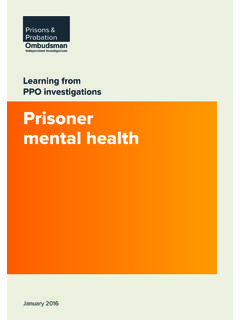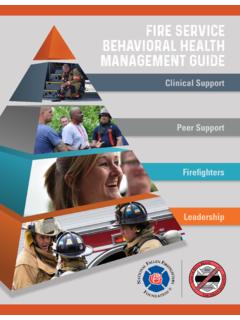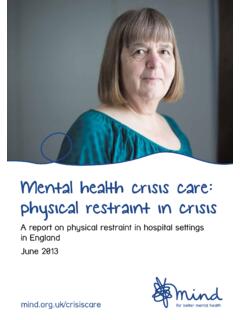Transcription of A national framework for recovery-oriented mental …
1 policy AND THEORYA national framework for recovery - oriented mental health services10287 August 2013A national framework for recovery - oriented mental health servicesPOLICY AND THEORYA national framework for recovery - oriented mental health services : policy and theoryPrint ISBN: 978-1-74186-012-2 Online ISBN: 978-1-74186-013-9 Publications approval number: 10287 Copyright Statements:Paper-based publications Commonwealth of Australia 2013 This work is copyright. You may reproduce the whole or part of this work in unaltered form for your own personal use or, if you are part of an organisation, for internal use within your organisation, but only if you or your organisation do not use the reproduction for any commercial purpose and retain this copyright notice and all disclaimer notices as part of that reproduction. Apart from rights to use as permitted by the Copyright Act 1968 or allowed by this copyright notice, all other rights are reserved and you are not allowed to reproduce the whole or any part of this work in any way (electronic or otherwise) without first being given the specific written permission from the Commonwealth to do so.
2 Requests and inquiries concerning reproduction and rights are to be sent to the Online, services and External Relations Branch, Department of health and Ageing, GPO Box 9848, Canberra ACT 2601, or via e-mail to sites Commonwealth of Australia 2013 This work is copyright. You may download, display, print and reproduce the whole or part of this work in unaltered form for your own personal use or, if you are part of an organisation, for internal use within your organisation, but only if you or your organisation do not use the reproduction for any commercial purpose and retain this copyright notice and all disclaimer notices as part of that reproduction. Apart from rights to use as permitted by the Copyright Act 1968 or allowed by this copyright notice, all other rights are reserved and you are not allowed to reproduce the whole or any part of this work in any way (electronic or otherwise) without first being given the specific written permission from the Commonwealth to do so.
3 Requests and inquiries concerning reproduction and rights are to be sent to the Online, services and External Relations Branch, Department of health and Ageing, GPO Box 9848, Canberra ACT 2601, or via e-mail to national framework for recovery - oriented mental health services : policy and theoryiiiForewordThe release of our national recovery framework marks a pivotal moment in the history of mental health services in Australia. recovery approaches are not new here; the movement has been gaining strength and momentum over many began as people with lived experience, carers and advocates sought greater influence and control over their experiences in mental health services . Then individual practitioners and organisations began to incorporate the recovery approach into their practice and service provision. What started as a grassroots movement led to government policy as national , state and territory governments formally adopted a recovery approach.
4 A national recovery framework agreed by all governments across Australia is the next important step along the path. Work on a national framework began in March 2011. Since the very beginning, people with a lived experience of mental health issues, their carers and families have participated enthusiastically in its development. Their passion and optimism have been inspirational. The process was a truly collaborative one with state and territory mental health service directorates and chief psychiatrists working in partnership to share research, gather evidence and create opportunities for participation by leaders, managers, practitioners, peer workers and volunteers in mental health services across Australia. There was a terrific response during the consultations and submissions. The framework has benefited greatly from the wisdom and unique experience of many people with mental health issues in their own lives or in the lives of their loved ones.
5 This is their framework . The consultations have made a lasting contribution to the national dialogue on recovery - oriented practice and this was in evidence during the national mental health recovery Forum in June 2012, which was an important step in the framework s progress. With the framework now in the public arena, the real work begins. The next stage is to make the framework live; to embed its principles into everyday practice and service delivery around the country. We need to capitalise on the momentum we have gained through the framework project and the June 2012 forum and achieve real change in how we respond to people with mental health issues and their families. We want a system that puts people with a lived experience at the heart of everything we do and offers consistently high-quality care that has long-term positive impacts on people s lives. Change of this magnitude is not easy and it takes time. As we establish and embed recovery approaches in mental health services across Australia, this guide will be a valuable resource to help us and remind us of the important reasons why we have embarked upon this journey.
6 Every one of us who is involved in the provision of mental health services leaders, practitioners, peer workers and volunteers has a role to play. I am continually impressed by your professionalism, compassion and empathy. I know that with your commitment we will achieve our vision of recovery -focused services that meet the needs and expectations of our national framework for recovery - oriented mental health services : policy and theoryivFor now though, let s take a moment to reflect and consider what we have achieved. Above all, the framework carries a message of optimism and hope; the message that people can recover, and many people do recover, from mental illness. This is a powerful message for people who are currently living with their own mental health issues, for their carers and families, and for the practitioners and peer workers who are supporting them on their way to recovery . It is the message we all need to Peggy Brown Chair Australian health Ministers Advisory CouncilA national framework for recovery - oriented mental health services : policy and theoryvContentsAcknowledgements viExecutive summary 11 About this document 72 About the framework 83 policy context 104 Relationship to Australia s mental health service standards 135 The national recovery framework at a glance 166 recovery .
7 The concept 177 Definitions 258 Language through a recovery lens 289 Domains and capabilities of recovery - oriented practice and service delivery 2910 Conclusion 32 Glossary 33 References 36A national framework for recovery - oriented mental health services : policy and theoryviAcknowledgementsThe national framework for recovery - oriented mental health services was developed under the guidance of the mental health , Drug and Alcohol Principal Committee acknowledges the significant work of the Safety and Quality Partnership Standing Committee, currently chaired by Associate Professor John Allan and formerly by Dr Ruth Vine, as well as the members of the recovery Working Group for their tireless work and support in oversight of this framework .
8 The framework was informed by extensive research, submissions and consultations, as well as by a wealth of articles, reports and policy documents both national and international. Most importantly, the framework was informed by the stories, pictures, thoughts and viewpoints of people with a lived experience of mental health issues, both in their own personal experience and in the lives of those close to them. Appreciation and thanks are extended to the many people who provided extensive feedback and comments during the development of the framework , particularly to those people with a lived experience, their carers and mental health practitioners who contributed so much of their time and expertise, participated in the public consultations and contributed their stories of lived experience. Thanks also to those who assisted in finalising the framework . Special thanks go to Dr Leanne Craze of Craze Lateral Solutions, the key author of the framework ; and to Ms Carolyn Fyfe, who has shared her art as well as her stories about recovery , some of which appear in this paper.
9 The framework has benefited greatly from the wisdom and unique experience of many people with mental health issues in their own lives or in the lives of their loved ones. A national framework for recovery - oriented mental health services : policy and theory1 Executive summaryAbout this documentThis background paper is a summary of the research and policy that underpins Australia s national framework for recovery - oriented mental health services . It provides an overview and definition of the concepts of recovery and lived experience. It outlines the policy context for a move to recovery - oriented approaches and cites relevant research. It briefly describes the practice domains and key capabilities necessary for recovery - oriented practice and service delivery. It also describes the relationship of the framework to Australia s national Standards for mental health services 2010. The framework is fully articulated in A national framework for recovery - oriented mental health services : Guide for practitioners and providers available at the frameworkThe national framework for recovery - oriented mental health services provides a vital new policy direction to enhance and improve mental health service delivery in Australia.
10 It brings together a range of recovery - oriented approaches developed in Australia s states and territories and draws on national and international research to provide a national understanding and consistent approach to recovery - oriented mental health practice and service delivery. It complements existing professional standards and competency frameworks at a national and state level. The lived experience and insights of people with mental health issues and their families are at the heart of this framework . Bringing lived experience together with the expertise, knowledge and skills of mental health practitioners offers opportunities to challenge traditional notions of professional power and expertise. The framework supports cultural and attitudinal change and encourages a fundamental review of skill mix within the mental health workforce, including increased input from those with expertise through experience. All people employed in the mental health service system1 regardless of role, profession, discipline, seniority or degree of contact with consumers will use the framework to guide their recovery - oriented practice and service delivery.









